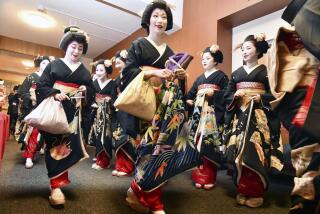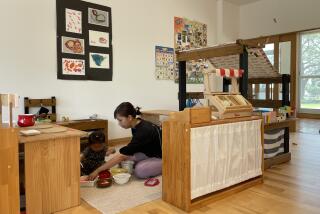A Rude Entrance Into Polite Society
- Share via
TOKYO — Seeking an antidote to rudeness, drunken rowdiness and a yawning generation gap, local organizers of Coming-of-Age Day ceremonies across Japan tried everything Monday from karaoke and charity auctions to rock concerts and dances with Mickey Mouse to keep young people’s attention.
The national holiday is a rite of passage in which 20-year-olds are welcomed into polite society, traditionally with long-winded speeches by local luminaries.
In recent years, however, a youthful mutiny has underscored the divide between older Japanese, who were weaned on hard work, self-sacrifice and respect, and the younger brood raised on materialism, video games and instant noodles.
Last year’s ceremonies were marred by young adults heckling mayors and governors, rushing stages, throwing beer cans, lobbing firecrackers and chattering away on their omnipresent cell phones.
“There was so much noise, we couldn’t tell when our ceremony started or ended,” said Isamu Miyauchi, an education official in Shizuoka.
While tame by Western standards, the disruptions shocked button-down Japan, sparking newspaper editorials, study groups and hand-wringing over the sorry state of today’s youth.
A decision by city officials in Urayasu, in consultation with youth groups, to hold this year’s ceremony at Tokyo Disneyland--complete with a chance to waltz with Mickey and Minnie--struck some traditionalists as pandering. But local official Hisao Orito said Japan needs to change with the times.
“Every society has its own rite of passage. Some native groups do bungee jumps or get circumcised,” he said. “We decided to do our ceremony this year at Disneyland.”
Other cities and villages shortened their ceremonies, some to a mere 15 minutes instead of several hours, and held them in hotels and parks rather than the usual dreary assembly halls and high school gymnasiums. Tomakomai in chilly Hokkaido opted for an ice skating rink.
Out With the Old, in With Nail Art
Tokyo’s Machida district decided to dispense with its ceremony altogether in favor of athletic meets, singing contests, fingernail painting displays and a planetarium show called “Dramatic Last Love Letter: The Reason We Love the Starry Sky.” Perhaps worried that things might become too interesting, however, it also included a lecture on pension reform.
Okayama weighed in with an a cappella concert, a kimono exhibit and a debate between the mayor and three young adults. The trio accused the mayor of squandering the city’s young talent by not taking their ideas seriously. “Wait until you are old enough to become elected officials,” he countered.
The city of Shiki auctioned off the mayor’s job for a day, and got $103 in charity donations. Whether the rent-a-mayor can do any better than the real one may be secondary. Youngsters remained quiet and attentive. “We’re quite happy with the results,” city official Masao Arai said.
Dangling carrots were supplemented in some cases by barely sheathed sticks. Young people are legally allowed to drink at 20, and beer is sold from vending machines in Japan. The towns of Fukushima and Akita banned alcohol at their ceremonies, however, while Naha posted 20 riot police, 120 regular police and 70 parent volunteers.
“We didn’t want a repeat of last year,” said Yuto Miyauchi, a Naha municipal official. “Some new adults drove a souped-up car, disrupted the ceremony and destroyed the gate of our ceremonial hall.”
Overall, there were far fewer incidents than last year across Japan. Six young men were arrested in Okinawa for heckling police. “They got furious, so I got furious back,” one of those arrested told a local reporter.
Though Japanese coming-of-age ceremonies appear steeped in tradition, the idea is said to have originated in 1945 in the town of Warabi outside Tokyo as a way of cheering up young men returning from the war. It soon caught on and eventually turned into a national holiday.
Growing Divide Between Generations
Behind all the hoopla over this year’s ceremonial face-lift is a more serious issue, said Takahiro Matsuzawa, a child psychology professor at Shikoku Gakuin University: the growing divide between the generations.
Young people tend to place more value on material possessions than human relationships compared with their parents’ generation, Matsuzawa said. But parents, teachers, bureaucrats and politicians also share the blame for providing poor role models, he said.
“While they are adults physically, many young people are not there mentally,” Matsuzawa said. “At the same time, many adults aren’t worth trusting. There are so many scandals, including tax officials found cheating on their taxes. We can’t just criticize children.”
Yohei Oishi, a 20-year-old resident of Shizuoka who helped organize an event for young adults, said the generations don’t listen to each other. “If we want to understand each other better, we need to talk,” he said. “By organizing this, I actually realized there were some cool adults.”
Others say that hidebound local organizers who have used the same format year after year are also at fault.
“If this were a private company, we would have changed a long time ago,” said Tsukasa Matsumoto, an education official in Machida. “Unfortunately, governments all too often lack imagination or creativity.”
Some Question Catering to Youth
Though much has been made of the recent disruptions, many municipalities report no trouble and stressed that the disruptions involve a minority of the nation’s 1.5 million 20-year-olds.
Shizuoka officials said they resisted the national trend to completely revamp their ceremonies. The city kept its traditional mayor’s speech, “presented in a rigid and solemn manner,” although it added a few other events on a different day.
“I think some of the other towns cater too much to the whims of young people,” said Miyauchi, the Shizuoka education official. “They just abandon their responsibility to make it easy on themselves. It’s selfish.”
Not according to 20-year-old Saori Takakura of Kurashiki.
“I hear that young adults in Urayasu went to Disneyland,” she said. “I’m so jealous.”
*
Hisako Ueno in The Times’ Tokyo Bureau contributed to this report.
More to Read
Sign up for Essential California
The most important California stories and recommendations in your inbox every morning.
You may occasionally receive promotional content from the Los Angeles Times.










